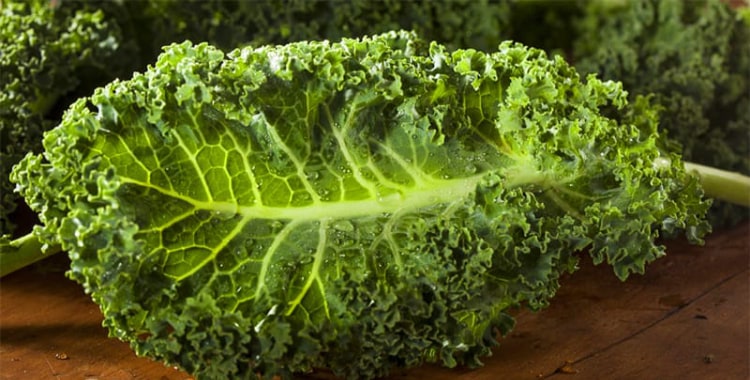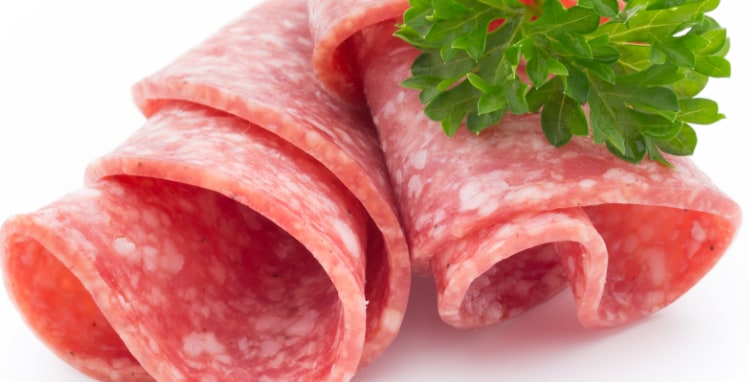
I’m not bragging, but I jumped on to the kale bandwagon long before the wagon rolled out of hipster neighborhoods and restaurants, serving kale chips and kale smoothies along the way. I may have jumped off other superfood bandwagons–mangosteen: that was fun while it lasted in the early 2000’s but açai berries won over my heart and tummy–but I plan on never abandoning you, kale, even if you do eventually lose hipster cred status.
Kale Nutrition: A Vitamin, Mineral & Antioxidant Powerhouse
If you’re wondering about what’s in kale that makes it so healthy, I’ll get to that in a second. First, though, if you’ve never visited my website, allow me to briefly introduce myself and tell you why my husband, Brandon, calls me the “Queen of Kale.” You see, years ago, I earned a certified nutritional therapist credential. I also became a private chef. Soon after launching my career as a chef, I created a recipe for an Organic Green Drink, featuring seven leafy green veggies with not one, but two varieties of kale.
My Green Drink became so popular that I created a business delivering organic green drinks with kale all over the country. This business–CHEF V–has evolved into a nationwide leader of shipped veggie juice and cleanse products. Sure, it took hard work to build what was once a small clientele into a customer list of thousands. But this success story isn’t about me; it’s all about kale playing a huge part in the amazing health transformations of thousands of CHEF V customers.
Here’s why I decided to use two varieties of kale in Green Drink:
- Each cup of raw kale has 3 grams of proteins but only has 33 calories
- Good source of fiber: 2.5 grams per cup, which is great for blood sugar levels and preventing cravings
- Super rich in vitamins A, B, C and K
- Good source of plant-based omega-3 fatty acids
- Rich in minerals such as calcium, zinc, phosphorus, potassium
- Loaded with antioxidants

Kale: The Leafy Green That’s So Nice, I Added It Twice
As I mentioned above, my certified-organic Green Drink has two types of kale: black and green.
Black and green aren’t the only types of kale. In fact, there are three main types and within each type there’s different varieties. For instance, the green kale I use is commonly known as curly kale. As for the black kale, its leaves actually have more of a bluish-green tint. You may hear black kale referred to as either Tuscan, dinosaur, or Lacinato.
Green kale is the one you’ll most likely find at the supermarket. For CHEF V Green Drinks, I source all the kale for 100% organic certified local farms.
In addition to curly/green and black kale, there’s also some interesting heirloom varieties that you might come across at a farmer’s market:
- Premier kale: can withstand cold temperatures
- Kamome Red: extremely bitter
- Siberian: even hardier than premier for surviving brutally cold weather
- Redbor: has a captivating psychedelic purple tint
- Red Russian: similar to Siberian; there’s also White Russian
- Walking Stick: can be used literally (the stems are huge!)
But wait! There’s more kale to try. There’s also Gulag Stars, Dwarf Blue Vates, Red Nagoya, Chinese Kale, and Sea Kale. If variety is the spice of life, then go get your kale on and try different types.

Why Is Kale So Good For You?
The reason why kale isn’t likely to fade away as a health trend anytime soon is because it’s not only super healthy, but it’s extremely versatile. That’s why you can make baked chips with it, along with soups, salads, smoothies and so much more. Sure, there’s tons of other superfoods and leafy green plants that deserve equal hipster cred pedestal status. (Cauliflower now seems to be enjoying its 15 minutes of fame.)
But let’s get back to focusing on the health benefits of kale. Why do so many medical experts consider it an important part of a healthy diet?
According to Dr. Drew Ramsey, someone whom I really admire for his work on treating depression, anxiety and emotional disorders through nutrition, kale offers some very impressive benefits:
- Fights inflammation
- Improves the liver’s detox ability
- Protects brain cells from stress
I love what Dr. Ramsey says about kale: “It talks to your DNA and tells it to sing the sweet, slow song of health and happiness.”
You won’t find that conclusion in the New England Journal of Medicine, but lots of other health experts agree that kale is worth including in your diet pretty much every day. (With one major exception: don’t eat too much of it if you take blood-thinning medication; the vitamin K in kale can interfere with the medication and cause blood clotting.)
According to Harvard’s T.H. Chan School of Public Health, green leafy veggies like kale have natural chemicals that act as a first-line defense for plants. These chemicals protect them from bugs and fungus. And it’s these same substances that may help protect us against certain types of cancer and heart disease. [SOURCE]

What Can Kale Do For You?
Researchers are still learning more about the natural compounds in kale and other leafy greenies.
But what we already know is that a diet rich in plants, especially leafy greens is beneficial for health in many ways:
- Antioxidants, vitamins and minerals boost your immunity and help prevent disease
- Keep blood sugar levels under control (prevent or manage type 2 diabetes)
- Fiber helps keep you full so you’re not tempted to eat empty-calorie snacks
I’ll admit though that eating raw kale everyday would be a drag. That’s why my mission of improving the health of thousands of people in the easiest way possible was born. My Green Drinks are cold-blended to preserve the fiber and nutrients. There’s no easier way of consuming leafy greens than by getting on a Green Drink subscription and having a serving each morning.
Don’t take my word for it though….
Kale Yeah! Green Drink Success Stories

“Thank you so much. I work about 13-14 hrs a day in the wardrobe department of a television show. It is so easy to eat junk all day. Me and the driver of my wardrobe trailer committed to the 3 day cleanse and we feel amazing. Day 1, was the toughest day. Day 2, I saw the difference in my everything. And Day 3, was an introduction to my New Self. We Thank you Chef V!” — Pashelle
Heartwarming Success Story: K.I. Lynn
From bestselling author K. I. Lynn on Facebook:
LONG post ahead. I hope you’ll read.
I haven’t updated any of my weight loss because I wasn’t really seeing it, but today, I did. Plus, I hate people seeing me like this.
When I left my job it was not because my books had done so well I was going to write full time. In fact, I was just beginning to edit Breach. I left as just a pause, one that ended up being needed, because within a few weeks I hurt my knee and my beloved grandmother passed away. The next year, I released Breach and my hubs said “Ok, you don’t have to go back to work.” BTW, in that time I’d had to have surgery on the injured knee.
Between the surgery and writing full time something happened that I did not expect.
I gained weight.
It wasn’t a lot at first, but it did scare me when I passed the highest I’d ever been. Then I cried when I passed the number I said I never would.
Each year, I gained more weight. All the travel and stress and another surgery and needing something quick and easy started to add up, and in 4 short years, I’d put on around 100 lbs. That’s a lot of weight!!
I felt terrible about myself. I hated going to signings because I hated how I looked and felt. I didn’t FEEL good.
The biggest thing about weight loss that people don’t understand is that it’s not about WANTING to lose weight, it’s about having the MOTIVATION to lose weight. Wanting can lead to depression as you stare in the mirror, and you lose any desire to eat healthy.
Earlier this year I’d finally had enough. I didn’t have the motivation, but I was sick of it all. Olivia Kelley-Santos had told me about her green drink that she drank that made her feel good, so I went on and saw they had a 21 day detox and I said “That’s what I need. That’s the push.”
I needed to purge all the bad stuff from my body and start fresh. I already knew I want to do low carb. Low carb, not Keto. The box full of everything I needed came in mid-March, right in the middle of working on Welcome to the Cameo Hotel.
The detox did exactly what I needed it to do, and I lost about 20lbs in a few short week. It gave me my motivation, so when it was over, I continued on eating healthier.
I try and stick to a max of 40 net carbs a day. As many of you know, I am a cheese fanatic, and cheese is life and in about every meal. It’s what keeps me going and on a healthier way of living.
For weeks, I watched the scale go down, little by little. I saw a stall, but moved past it. I avoided temptation, and if I did fall, I had only a very small portion.
Then, in July, it happened – I hit my first milestone.
50lbs gone
Elena M. Reyes came to visit and there were some signings, but I managed not to gain any weight. For my birthday I splurged for almost a week eating anything I wanted, because for my birthday, that was all I wanted.
However, that splurge came with consequences. I had the taste for carbs and sugar again. I got back on my diet, but I found I was caving to cravings with little arm bending.
So here I am, doing a small 3 day cleanse with the green drink to get me back on track. I’m down 54lbs in total, and hope to be down quite a bit more by Wild and Windy.
I have goals, and one of them is to get this 100lbs off by the end of the year. I think I can do it. There are more goals after that, but for now, my eye is on the prize.
Just going to keep swimming.








